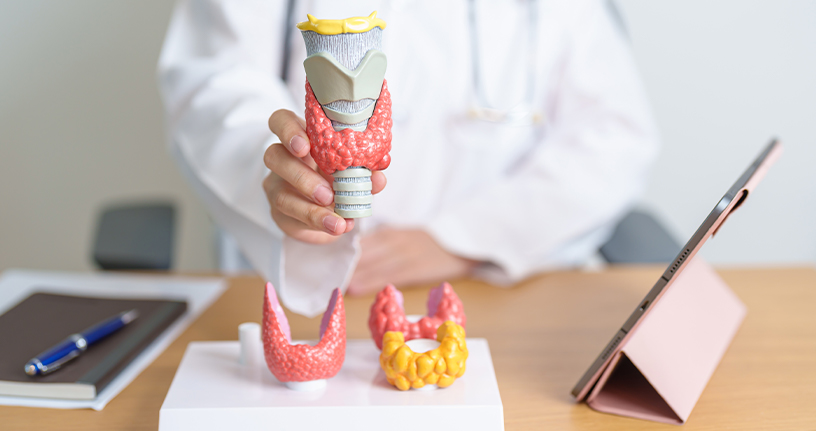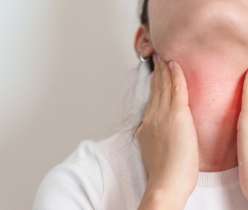Hypothyroidism is a common health issue that can be chronic if not managed regularly. In this condition, the thyroid gland in the front of your neck doesn’t produce enough thyroid hormones to meet the body’s needs. These hormones are crucial for regulating metabolism, energy levels and production, and various other bodily functions, growth, and development.
When the thyroid gland works effectively, it constantly generates hormones, releases them, and replaces new hormones with used or old ones. This enables our metabolism to function well in our body system. The pituitary gland (located in the center of the skull below the brain) controls the amount of thyroid hormones in the bloodstream. When our pituitary gland senses low or high thyroid hormone, it adjusts these hormes and balances them.
Too high thyroid hormones are called hyperthyroidism, and too low thyroid hormone is called hypothyroidism, which affects and impacts the entire body. Some common complications associated with hypothyroidism include goiter, heart issues, infertility and miscarriage, osteoporosis, and cognitive impairment.
Myxedema condition can caused when thyroid levels become extremely low. It is a very serious health disorder that causes a low body temperature, anemia, confusion, heart failure, and coma. This hypothyroidism is life-threatening; hence its treatment should not be neglected.
People of all ages, ethnicities, and genders can be affected by hypothyroidism. Women are more likely to get affected by this disease, especially after menopause.
Common causes of hypothyroidism:
Let’s find out the common causes of hypothyroidism.
Hypothyroidism can have a primary and secondary cause. The primary cause directly impacts the thyroid by creating low thyroid hormones. The secondary cause happens when the pituitary gland fails and stops sending TSH (thyroid stimulating hormone) to the thyroid to balance the hormones.
The primary cause is much more common than the secondary.
-
- Hashimoto’s thyroiditis (the most common primary condition) – Hashimoto disease is an autoimmune disorder where the immune system attacks the thyroid gland. It is a hereditary condition. This condition prevents the thyroid from making and releasing enough thyroid hormone.
- Iodine deficiency – Iodine is necessary and important in thyroid hormone production; its deficiency can lead to hypothyroidism.
- Thyroid surgery or radiation therapy – Removing or damaging part of the thyroid can decrease hormone production.
- Congenital hypothyroidism – Some babies are born with an underactive thyroid gland.
- Certain medications – Lithium and amiodarone, among others, can interfere with thyroid function.
Diagnosis of hypothyroidism:It is typically diagnosed through blood tests that measure levels of thyroid hormones (T4) and thyroid-stimulating hormone (TSH). A high TSH and low T4 level indicate hypothyroidism. Other tests may include:
-
- Free thyroxine (FT4) and free triiodothyronine (FT3) tests
- Thyroid antibody tests (e.g., TPO, TgAb)
- Imaging tests (e.g., ultrasound, CT scan)
The common hypothyroidism symptoms include:
-
- Fatigue and lethargy
- Weight gain
- Cold intolerance
- Dry skin and hair loss
- Constipation
- Depression and mood swings
- Muscle weakness, aches, and experiencing tingling and numbness in hands.
- Heavy or irregular menstrual periods
- Decreased sexual drive
- Physical changes on the face (i.e., eyes and face puffiness, drooping eyelids, etc.)
- Memory issues
The best solutions to manage hypothyroidism:
Hypothyroidism is a treatable condition and can be managed with regular medication and the right diet intake. The continuation medication is required for the rest of your life to normalize the body’s hormone levels. Consult your doctor to find out the best hypothyroidism medicine to manage your condition. Careful management and scheduled doctor consultations help you lead a normal and healthy life.
Certain exercises and yoga poses also help to control /balance your thyroid hormone levels. Speak to a yoga teacher or trainer who can guide you in performing these exercises and poses (asanasa).
Hypothyroidism treatment options:
-
- The standard treatment is levothyroxine (the most common hypothyroidism pills), a synthetic thyroid hormone that compensates for the hormone deficiency known as thyroid hormone replacement therapy. It is usually taken daily, and the dosage may be adjusted based on regular monitoring of TSH levels. Some hypothyroidism medicine names include Thyronorm 50 mcg, Eltroxin 100 mcg, Linorma T3 20 mcg, and more.
- Synthetic T4 (Synthroid, Levoxyl)
- Synthetic T3 (Cytomel)
- Natural desiccated thyroid (NDT)
- Lifestyle modifications (diet, exercise, stress management)
The medicine dosage varies from patient to patient based on the severity of the condition. Regular administration of hypothyroidism medicine is important to keep the health complications at bay.
Diet and nutrition:
Don’t try out any diets without consulting your doctor or nutritionist. Iodine is an important mineral that helps your thyroid produce balanced hormones. For low levels of thyroid hormone, eating iodine-rich food helps increase the hormone levels.
-
- Iodine-rich foods (seafood, iodized salt)
- Selenium-rich foods (Brazil nuts, fish)
- Zinc-rich foods (oysters, beef)
- Eggs
- Moderate dairy product intake
- Avoid soy and cruciferous vegetables (may interfere with thyroid function)




